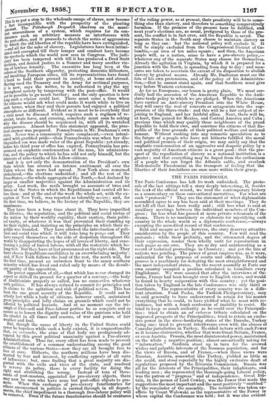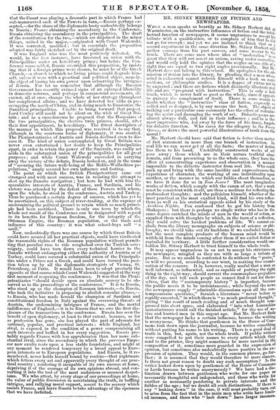THE PARIS PROTOCOLS.
THE Paris Conference has left its work unfinished. The proto- cols of the last sittings tell a story deeply interesting, if, besides the text of the official record, we read the contemporary history as a commentary on these conventional narratives. For what are such " protocols" ? They are the statement of what diplomatists assembled agree to say has been said at their meetings. They do not tell all that has been really said ; still less what is said at auxiliary meetings between the individual members of the Con- gress ; far less what has passed at more private rehearsals of the drama. There is no machinery so elaborate for mystifying each country in the whole world as a diplomatic conference,—always excepting the accredited record of that conference. Bald and meagre as it is, however, the story deserves attentive consideration by the people of this country. Few will read the protocols ; while their prolixity, and the attenuated degree of their expression, render them wholly unfit for reproduction in such pages as our own. They are as dry and uninteresting as a record of technical proceedings in Chancery ; and yet the fate of nations was pending. The power of great empires was, as it were, embezzled for the purposes of courts and officials. The whole process is a machinery for defeating the most straightforward and the most independent states. In the recent assembly at Paris our own country occupied a position calculated to humiliate every Englishman. We were assured that after the interviews of Os- borne, France had been brought over to English views, and would be found in hearty cooperation with this country ; yet the posi- tion taken by England in the late Conferences was only third or fourthrate. The representative of every country was in a diffe- rent situation. Fuad Pasha, the Turkish Plenipotentiary, may be said generally to have endeavoured to retain for his master everything that he could, to have yielded what he must with re- luctance, but with a frank confession of inability to resist. He tried to keep as much authority as he could over the Principali- ties ; tried to obtain an ad valorem tribute calculated on the improved prospects of the Principalities; tried to retain an exclu- sive power in the river-bordering states of the Danube, Turkey being one; tried to prevent interference even with the abuses of Consular jurisdiction in Turkey. He sided in turn with each Power as it became obstructive, whether that were Great Britain, France, or even Austria. Prussia, the most disinterested power, maintained on the whole a negative position ; almost sarcastically asking for " information." Sardinia stood up in turn for the avowed wishes and palpable interests of the Rouman population, and for the views of Russia, and of France,—when those views were Russian. Austria, somewhat like Turkey, yielded as little as she could, and stood especially by the highly exclusive draft of regulations proposed by the Riverain Commission. Russia was all for the interests of the Principalities, their inhabitants, and leading men ; she represented the thorough-going Liberal policy, was the patron of " progress " and of independence. Great Bri- tain, in the person of Lord Cowley, was the Power that made the suggestions the most important and the most positively " snubbed " by the remainder of the assembly. The initiative was taken ex- officio by Count Walewaki as the representative of the Power in whose capital the Conference was held; but it was also evident
that the Count was playing a dramatic part in which France had out-manoeuvred each of the Powers in turn,—Russia perhaps ex- cepted,—for the share of the diplomatic booty undoubtedly belongs to Russia; France obtaining the ascendancy in the Conference, Russia obtaining the ascendancy in the principalities. The draft of the constitution for the two,—which are disjoined in the minor things, united in the major,—originated with Count Walewski. It was corrected, modified ; but in essentials the proposition adopted was fairly sketched out by the original draft.
It was England who was the most positively defeated. She would, in the first instance, have favoured an union with the Principalities under an hereditary prince ; but before the Con- ference reassembled, Russia overruled this proposition, by insist- ing that if a foreign prince were chosen, he must be of the Greek Church,—a church to which no living prince could degrade him- self, unless it were with a practical and political object, namely, the object of basing his own power upon subserving the intrigues of Russia. For let us remember that although the Russian Government has recently evinced signs of an enlarged liberality in domestic reforms, and perhaps in commercial movements, she cannot, all at once, change the whole of her strategy throughout her complicated affairs ; and we have detected her alike in pre- occupying the north of China, and in doing much to Russianize the Danubian principalities. Unable to bring forward that project, Lord Cowley still could not be silent on the wish of Great Bri- tain; and as a succedaneum he proposed that the Hospodars of the two principalities, the elective twin princes, should, after their first appointment, be hereditary. The fittest description of the manner in which this proposal was received is to say that, although in the courteous forms of diplomacy, it was scouted. The Plenipotentiaries of Austria and Russia declined even to dis- cuss it. The kind of union contemplated by Great Britain was never even entertained her desire to keep the Principalities apart, in order to retain the power of the Suzerain, was coolly set aside in the substantial union of the principalities for all great purposes ; and while Count Walewski succeeded in carrying away the victory of the debate, Russia looked on, and in the name of "securing the future well-being of the Moldo-Wallachian po- pulations," amply secured her own influence and footing. The point on which the British Plenipotentiary came out strongest and with most success, was in resisting the attempt to shut up the Danube navigation ; but here he had with him the speculative interests of Austria, France, and Sardinia, and his victory was attended by the defeat of those Powers with whom, upon the whole, he stood in the conference, Austria and Turkey. Thus he purchased a certain degree of success, which has yet to be ascertained, on this subject of river-trading, at the expense of undermining the political ground to retain which so much princi- ple had been sacrificed. There is only one term by which the whole net result of the Conference can be designated with regard to its benefits for European freedom, for the integrity of the Ottoman Empire, the Rouman population, blation, or the trade and influence of this country : it was what school-boys call " a mull."
Now, undoubtedly there was one course by which Great Britain could have secured all her practical objects, could have vindicated the reasonable rights of the Rouman population without permit- ting that peculiar race to ride roughshod over the Turkish sove- reignty, could have torn down every technical barrier to the Danube without endangering either the authority of Austria or of Turkey, could have secured a substantial union of the Principali- ties under a Prince not a Greek, and could have turned the posi- tion taken up by all the diplomatic strategists of Vienna, St. Petersburg, or Paris. It would have been to adopt precisely the opposite of that course which Count Walewski suggested at the very first moment of reopening the conferences. It was that the Pleni- potentiaries " should decide upon an absolute secrecy to be ob- served as to the proceedings of the conferences." It is to Russia, who stood up as the champion of Rouman interests,—to Russia, who took the initiative in proposing to abolish consular abuses,— to Russia, who has made herself the champion of Sardinia and constitutional freedom in Italy against the overawing threat, of Austria, the undermining intrigues of France, and the mortal
indifference of England,—it is to Russia that we owe the first dis- closure of the transactions in the conference. Russia has seen the benefit of open diplomacy, at least to that extent, because, so far as profession has gone, she has played the part of advocate for national, popular, and practical interests ; while England, her
rival, is exposed in the condition of a power compromising all such interests and baffled in her every suggestion. Russia pro- bably regards France with less apprehension than her more sub- stantial rival, since the ascendancy in which the parvenu Empe- ror now exults rests upon a less stable foundation, and might at any moment be rendered temporary by a broad appeal to Euro- pean interests or to European populations. And Russia, be it re- membered, never holds herself bound by routine—that nightmare which fetters every act and apparently every thought of our time- tied country ; rendering it incapable of its own success at home, depriving it of the courage of its own opinions abroad, and con- verting it into the tool of the most audacious or meanest despot- isms. We who attest, by every stage of our proceedings at home, the value of public discussion in ascertaining the truth, in baffling intrigue, and rallying moral support, assent to the secrecy which assists France, and leave Russia to take advantage of the openness that we have forfeited.



































 Previous page
Previous page